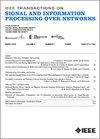异步自感功能失效下多Agent系统的容错有限时间一致性
IF 3
3区 计算机科学
Q2 ENGINEERING, ELECTRICAL & ELECTRONIC
IEEE Transactions on Signal and Information Processing over Networks
Pub Date : 2023-07-26
DOI:10.1109/TSIPN.2023.3299079
引用次数: 0
摘要
本文研究了具有部分智能体的单/双积分多智能体系统在异步自感功能失效(SSFF)情况下的容错有限时间一致性(FTC)问题。首先,提出了DRMNNS策略,通过将异步SSFF转换为多个分段同步SSFF,并与受SSFF约束的代理一起使用多跳通信(MHC)作为路由节点,来恢复正常代理之间的网络拓扑连接。其次,通过利用受SSFF影响的代理的最小跳正常邻居集(MHNNS)中所有代理的状态和输入信息,并利用受SSF影响的代理在其MHNNS变化时的历史信息来计算其状态信息,分别设计了两个具有单/双时变增益的切换容错FTC协议,第三,通过分别研究正常智能体的闭环动力学和受SSFF影响的智能体的开环动力学,进行了收敛性分析,并导出了基于时变增益的收敛条件。结果表明,使用所提出的DRMNNS策略和两个具有适当时变增益的容错FTC协议,异步SSFF下的单/双积分器MAS可以分别达到FTC/有限时间动态一致性(FTDC)。最后,通过对比数值模拟验证了理论结果的有效性。本文章由计算机程序翻译,如有差异,请以英文原文为准。
Fault-Tolerant Finite-Time Consensus of Multi-Agent Systems Under Asynchronous Self-Sensing Function Failures
This article investigates fault-tolerant finite-time consensus (FTC) problems of single/double-integrator multi-agent systems (MASs) with partial agents subject to asynchronous self-sensing function failures (SSFFs). First, the strategy named DRMNNS is developed to recover the connectivity of network topology among normal agents by converting asynchronous SSFFs into multiple piecewise synchronous SSFFs and using multi-hop communication (MHC) together with agents subject to SSFFs as routing nodes. Second, by employing the state and input information of all agents in minimum-hop normal neighbor set (MHNNS) of an agent subject to SSFF and utilizing the history information of the agent subject to SSFF for computing its state information at the instants when its MHNNS changes, two switching fault-tolerant FTC protocols with single/double time-varying gains are designed, respectively, for single/double-integrator MASs. Third, convergence analysis is carried out by separately investigating the closed-loop dynamics of normal agents and the open-loop dynamics of agents subject to SSFFs, and convergence conditions in terms of time-varying gains are derived. It turns out that single/double-integrator MASs under asynchronous SSFFs using the proposed DRMNNS strategy and two fault-tolerant FTC protocols with proper time-varying gains can reach FTC/finite-time dynamical consensus (FTDC), respectively. Finally, comparison numerical simulations are provided to illustrate the effectiveness of the theoretical results.
求助全文
通过发布文献求助,成功后即可免费获取论文全文。
去求助
来源期刊

IEEE Transactions on Signal and Information Processing over Networks
Computer Science-Computer Networks and Communications
CiteScore
5.80
自引率
12.50%
发文量
56
期刊介绍:
The IEEE Transactions on Signal and Information Processing over Networks publishes high-quality papers that extend the classical notions of processing of signals defined over vector spaces (e.g. time and space) to processing of signals and information (data) defined over networks, potentially dynamically varying. In signal processing over networks, the topology of the network may define structural relationships in the data, or may constrain processing of the data. Topics include distributed algorithms for filtering, detection, estimation, adaptation and learning, model selection, data fusion, and diffusion or evolution of information over such networks, and applications of distributed signal processing.
 求助内容:
求助内容: 应助结果提醒方式:
应助结果提醒方式:


